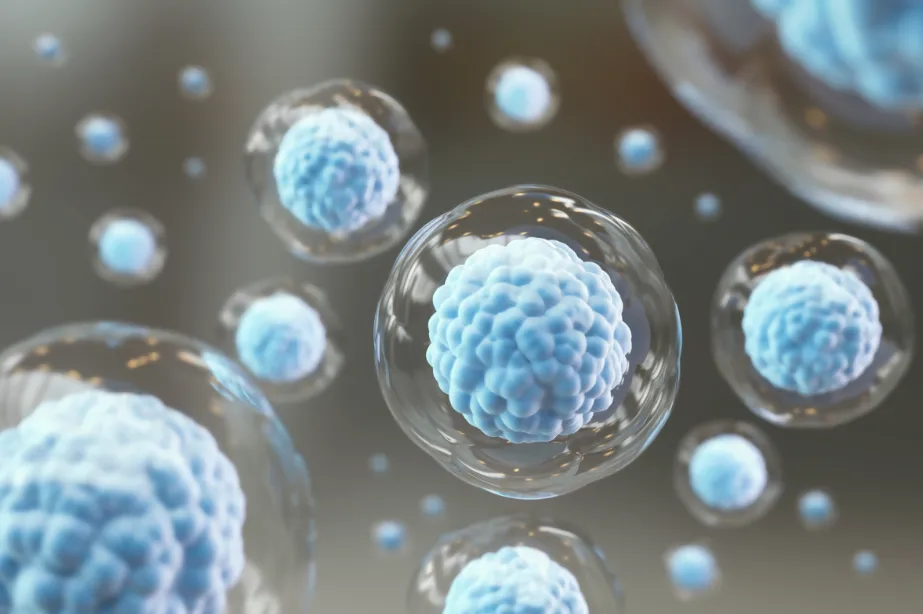Autophagy: The Remarkable Process with Amazing Health Benefits
Understanding Autophagy: The Process of Cellular Self-Cleaning and Repair
Autophagy, a Greek term meaning "self-eating," is a remarkable process that allows our bodies to clean up cellular garbage and promote cellular repair. In this blog post, we will explore the importance of autophagy, how it works at a cellular level, and how we can activate it for optimal health.

Autophagy is a critical process for our cells as it helps clear out cellular waste, including food particles, viruses, bacteria, inflammatory molecules, and even cancer cells. It activates the healing power of each cell in our body, allowing them to repair themselves. Under an electron microscope, we can observe autophagy in the lysosomes, which contain enzymes that break down proteins, DNA, RNA, polysaccharides, and lipids.
Dr. Yoshinori Ohsumi, a Japanese cell biologist and Nobel Prize winner, made breakthrough discoveries on the mechanisms of autophagy. His work has shed light on the importance of this process in maintaining cellular health.
The Negative Impacts of Impaired Autophagy: External Symptoms, Internal Issues, and Inflammation
When autophagy is not functioning correctly, our cells become cluttered with waste, leading to symptoms like fatigue, brain fog, bloating, skin blemishes, and internal issues such as fatty liver, insulin resistance, and inflammation.

One of the primary repercussions when autophagy malfunctions is the onset of fatigue, which hampers our vitality and energy levels. This weariness can permeate our daily lives, impeding our productivity and affecting our quality of life. Additionally, autophagy malfunction can lead to cognitive impairments, called brain fog, characterized by a lack of mental clarity, reduced focus, and impaired memory.
Furthermore, the disrupted autophagy process accumulates waste materials within our cells, leading to physical manifestations such as bloating and skin blemishes. These unwanted external symptoms can be challenging to manage and may impact our self-confidence and emotional well-being.
The consequences of impaired autophagy extend beyond external manifestations, as they can also give rise to internal issues. One notable example is the development of a fatty liver, wherein excess fat accumulates within liver cells, potentially leading to complications such as liver inflammation and scarring. Similarly, the dysfunction of autophagy can contribute to insulin resistance, a condition in which the body's cells lose their responsiveness to insulin, thereby hindering the regulation of blood sugar levels. This can pave the way for the development of metabolic disorders like diabetes.
The chronic inflammation resulting from malfunctioning autophagy cannot be overlooked either. The accumulation of waste products and dysfunctional cells triggers an inflammatory response, leading to systemic inflammation. This chronic inflammation not only exacerbates existing health conditions but also plays a crucial role in the onset and progression of various diseases, including cardiovascular diseases, autoimmune disorders, and even certain types of cancer.
Therefore, understanding and addressing the complexities surrounding autophagy malfunction are pivotal in promoting cellular health. By uncovering strategies that can optimize autophagy, we can mitigate the detrimental effects of waste accumulation, ultimately paving the way for improved energy levels, cognitive function, physical appearance, and internal health.
The Crucial Role of Autophagy in Detoxification, Cardiac Health, and Brain Function
Among its numerous benefits, autophagy is fundamental in optimizing the detoxification process in our liver cells. Liver cells, or hepatocytes, filter and remove toxins from our body. However, certain toxins are fat-soluble, making them challenging to eliminate efficiently. This is where autophagy occurs, acting as a critical mechanism for converting fat-soluble toxins into water-soluble ones. By doing so, autophagy facilitates the liver's ability to detoxify our body, promoting optimal organ health effectively.

Additionally, autophagy contributes extensively to the remodeling and repairing our heart cells, significantly influencing cardiac health. The process helps eliminate damaged or dysfunctional components within cardiac cells, enabling their replacement with new, healthy components. This leads to improved heart function and overall cardiovascular well-being.
Furthermore, the impact of autophagy extends to the health and vitality of our brain cells. Through autophagy, neurons can eliminate accumulated waste products and damaged cellular components, maintaining cellular integrity and promoting optimal brain function. This process has been linked to improved cognitive function, neuron longevity, and the prevention of neurodegenerative diseases.
Moreover, autophagy aids in healing inflammation throughout the gastrointestinal tract, playing a critical role in maintaining gut health. By removing damaged cellular components and reducing chronic inflammation, autophagy supports restoring and balancing gastrointestinal tissues, contributing to overall digestive well-being.
Another remarkable effect of autophagy is its ability to shut down insulin, crucial for preventing insulin resistance and metabolic syndrome.
Insulin, a hormone the pancreas produces, regulates glucose levels in the bloodstream. When insulin resistance occurs, the body's cells become less responsive to this crucial hormone.
Autophagy, through its intricate mechanism, aids in preventing insulin resistance. Autophagy maintains cellular homeostasis by selectively degrading and recycling dysfunctional proteins and organelles. It prevents the accumulation of cellular waste products. This process ensures that the insulin receptors on cell membranes remain intact and functional, allowing for efficient glucose uptake by the cells.
The ability of autophagy to regulate insulin, prevent insulin resistance, and mitigate inflammation showcases its profound impact on metabolic health. Understanding these complex molecular interactions provides valuable insights into the potential therapeutic applications of autophagy modulation in addressing insulin-related disorders and metabolic syndrome.
In summary, autophagy plays a multi-faceted and indispensable role in organ health. Its involvement in liver detoxification, heart cell remodeling, brain cell health, gastrointestinal inflammation healing, and insulin resistance prevention highlights its significant role in maintaining overall physiological well-being. Understanding and harnessing the potential of autophagy can lead to innovative therapeutic approaches for various organ-related conditions, ultimately improving human health and quality of life.
Unlocking Therapeutic Potential: Activating Autophagy through Fasting for Improved Health and Quality of Life
So, how can we activate autophagy? The answer is simple: fasting. When we fast, our body focuses on autophagy as no fuel comes in.
During fasting, our body shifts its energy utilization from the digestion and absorption of nutrients to the mobilization and utilization of stored energy reserves. As a result, the lack of incoming fuel triggers a cascade of metabolic adaptations and signaling pathways, including autophagy.
Fasting triggers a shift in the body's metabolic priorities, leading to the activation of autophagy.
Intermittent fasting, where you skip one meal, is a popular option. Starting by skipping one meal, such as breakfast or dinner, allows your body to experience a brief fasting period. During this time, your cells may enter a state of autophagy, clearing out unfit components and optimizing cellular function.
Increasing the fasting window from 12 to 18 hours enhances the autophagic response further. This extended fasting period prompts cells to undergo deeper autophagy, providing more profound benefits.
Additionally, it is crucial to maintain a balanced and nourishing diet during your eating window to support optimal cellular function and nutrient intake. Incorporating nutrient-dense foods, such as fruits, vegetables, whole grains, and lean proteins, can provide essential nutrients and support the autophagic process.
The Importance of Extended Fasting and Autophagy in Cellular Cleansing and Repair
Extended periods of fasting, ranging from three to five days, can yield even more profound impacts on the process of autophagy. It amplifies the benefits of autophagy. During this time, the body undergoes a more comprehensive cleanup process, eliminating accumulated cellular debris that might need to be more efficiently addressed during shorter fasting periods.

However, it is crucial to approach extended fasting cautiously and seek guidance from healthcare professionals to ensure safety and mitigate potential risks. Adequate hydration and proper refeeding after the fast are also essential to support the body's recovery and replenishment of nutrients.
Sleep is another way to activate autophagy, as our cells recover and repair themselves during sleep. During sleep, our bodies initiate various biological processes that aid cell rejuvenation and repair. Autophagy is one such process, where cells eliminate damaged or dysfunctional components, allowing for the regeneration of healthier versions. This mechanism is a cell maintenance system, enabling them to function optimally.
Furthermore, cultivating a healthy circadian rhythm is paramount for promoting autophagy and maintaining overall health. The circadian rhythm is the internal biological clock that regulates sleep-wake cycles and other bodily functions. Disruptions to this rhythm, such as irregular sleep patterns or insufficient sleep duration, can hinder the activation of autophagy, leading to potential health implications. So, good sleeping habits are critical catalysts for activating autophagy and maintaining optimal cellular health.
While fasting, it is crucial to stabilize blood sugar levels, stay hydrated, and replenish electrolytes. Adding good fats to your diet, such as avocados, nuts, and olive oil, can help stabilize blood sugar.
Drinking coffee or organic green tea can also increase autophagy. However, avoiding adding cream, butter, or collagen protein to your coffee is essential, as it can inhibit autophagy.
Fasting is a cost-effective way to improve your health, as it saves money on food and the time spent preparing it. However, it is essential to be mindful of your body's signals and consult your doctor to find the proper fasting interval. Women should also consider their menstrual cycle when planning extended fasts, as certain phases are more suitable for fasting.
In conclusion, autophagy is a remarkable process that allows our cells to clean up and repair themselves. Activating autophagy through fasting can lead to weight loss, reduced inflammation, and improved overall health. Finding the right balance between food and fasting is crucial for optimal health. Listen to your body, consult with your doctor, and enjoy the benefits of autophagy for a healthier life.
